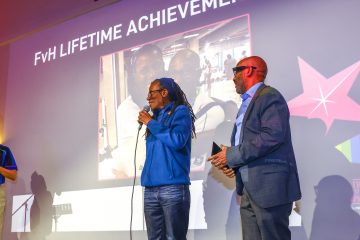‘I’ll never compromise on reporting truth in sports media’: Evie Ashton Q&A in Lesbian Visibility Week
Evie Ashton is a multiple award-winning freelance journalist whose recently-launched Substack blog ‘It’s Just a Game’ is dissecting both sports and sports media in ways rarely seen in the mainstream; to mark Lesbian Visibility Week, we asked her about the response from the industry, LGBTQ+ storytelling, and more…

The headline on the launch article of Evie Ashton’s Substack blog was succinct and stark – ‘Why I no longer want to be a sports journalist’.
The industry sat up and took notice. Here was a rising star with bylines in BBC Sport and Sky Sports, who had recently graduated with distinction from the Sports Journalism MA course at St Mary’s Twickenham, outlining why she was “feeling disillusioned” even at a young age.
Evie laid bare the frustration of seeing content on important issues being churned out by so many outlets for its supposed SEO value, at a time when sports is crying out for constructive criticism.
“Few things generate more clicks and views than men’s football, misogyny, and transphobia,” she wrote.

This wasn’t a farewell to arms, however. In recent months, Evie has produced a series of sharp, insightful commentaries on sporting issues, enhancing her burgeoning reputation.
Previously recognised at the SJA British Sports Journalism Awards, she recently won the NCTJ Student Sports Journalism Award and was named the ECB Young Cricket Journalist of the Year.
Evie is part of Sports Media LGBT+’s core group of network members and to mark Lesbian Visibility Week, we invited her to join us for a Q&A…
SMLGBT+: Hi Evie! Thanks for the chat. It’s been nearly three months since you launched ‘It’s Just a Game’ – there was considerable industry reaction to your first post. Looking back, what did you make of the response?
Evie: Thanks for the invite! When I launched the Substack, I always knew I was taking a risk to publish my thoughts about feeling disillusioned with the industry.
I suspected the article would generate interest so I tried to prepare mentally for potential positive and negative reactions, but when faced with the reality, I was quite shocked.
I couldn’t help feeling anxious, seeing how many people were interacting with the article, who they were and who they worked for.
At the same time, the content of the responses saying they related and understood made me feel validated and reassured that I had done the right thing, and sadly, not alone.
Ultimately, the point was to use my privilege as a white middle-class cisgender person to trigger conversations among industry leaders, journalists, PR and comms professionals, and students about whose interests sports and sports journalism currently serve.
I think the response showed I’d done that somewhat, which I’m proud of and reflects the journalism I’m all about and will never compromise on – to report on the truth and make a difference.
Credit to you for taking that on. Since the launch, you’ve focused on highlighting misogyny, sexism and transphobia in sport. Why is independent media coverage of these issues so important?
As discussed in my first post, evidence shows that sports media and sport have a symbiotic relationship in which their economic interests are dependent on each other, so there is only so far each of them is willing to go to challenge and criticise, particularly on structural issues you mentioned.
Independent coverage grants greater freedom to report on the evidence of how they manifest, why, and what needs to be done, which in turn results in a more informed and educated audience who enact change in their day-to-day lives.
That said, I’m conscious of the potential little capacity for social change that independent coverage can have, as most of the power to hold sports governing bodies to account is held by dominant actors of the sports media industry.
In a way, having independent coverage sidelined to individual journalists and small publications is still on their terms by allowing sport and the media to retain power and maintain the status quo.
Cricket is one of your specialist sports, and you were recently recognised with the ECB Young Journalist of the Year Award. What did that mean to you?
I was delighted! There’s so much time and effort that goes into these types of articles, such as researching ideas, contacting communications officers, sourcing athletes who are willing to speak on personal issues, pitching to editors, planning sensitive, careful interview questions, and crafting a story that does justice to their words.
So it felt brilliant to have that behind-the-scenes work rewarded and it gave me a little bit of hope that some people in the industry are trying to make space for and promote unheard and historically marginalised stories in the cricket media.
We know there are fewer ‘traditional’ sports media jobs available nowadays. You’re demonstrating initiative with self-produced content across different platforms. What advice would you give fellow graduates looking to get noticed?
Firstly, find out what’s already being done to work out what gaps exist. Learn the industry inside out by reading all the output of various publications, including match reports, analysis pieces, colour pieces, quotes pieces, opinion pieces, investigations, long-form features, and the work of successful journalists. Then you’ll have a great idea of how your work could fill those gaps.
Secondly, find a niche you actually care about. Read books to do this! For me, it’s the intersection of sport and social justice. That passion will come across in your work and (I think) people love that.
Thirdly, practice and find your voice. Even if it’s your own blog or YouTube channel that you’re just starting, spending time refining your journalistic skills will prepare you for the public opportunities where you could get noticed. I’m still finding my voice using my newsletter.
It’s Lesbian Visibility Week, which is growing year-on-year as an awareness activation. In 2023, we covered on the site how women’s football has struggled to embrace LVW in any tangible way. What would be worth discussing within the game this week, LGBTQ+ wise?
The cultural and social impact of the UK Supreme Court’s ruling on LGBTQ+ participation and enjoyment of sport is central to discuss.
Coverage must centre the voices of trans women, trans men and non-binary people in sport and discuss what is holding journalists back from doing so, e.g., lack of education and training on handling these issues [read Evie’s latest blog on this topic here].
I’m also going to steal a point made by Natalie Washington, whom I interviewed for a feature on EDI in women’s football in the upcoming issue of SEASON zine. Despite strong lesbian (and bisexual) representation in the game, we don’t hear them talking about it that much.
For example, more work could be done to build players’ confidence and to talk about their lived experience at the elite level, to inspire girls and women lower down the pyramid. This perhaps limits engagement with LVW in the game.
It's been claimed the UK Supreme Court's ruling will protect women's rights in sport. I unpacked this & show how the ruling, driven by ‘women’s rights’ campaigners & gender critical feminists, actively harms the interests of the women they purport to serve.✍ evieashton.substack.com/p/womens-rig…
— Evie Ashton (@evieashton.bsky.social) April 23, 2025 at 6:34 PM
[image or embed]
Who are the fellow sports journalists, including Substackers, who are working on similar themes who you admire most, and why?
Sports broadcaster Miriam Walker-Khan, and journalists Suzy Wrack and Jonathan Liew. On Substack, Karim Zidan, who founded Sports Politika.
These journalists are not afraid to go against the grain and bring uncomfortable truths and lived experience to light.
Their work takes sports seriously, beyond just an arena of entertainment, by examining how privilege, power, and politics is reproduced within sport and affects wider society.
They also speak and write in ways that make these topics engaging and worth reading which is something I’m always trying to learn and improve on.
Euro 2025, Rugby World Cup, Cricket World Cup in India… it’s going to be a huge summer and autumn for women’s sports. What are the potential talking points from those mega events that ‘It’s Just a Game’ might be exploring?
Has diversity in the England squad improved since Euro 2022, if so why, if not why?
The same questions must be asked of the England rugby and cricket squads. How much are these teams being paid relative to men’s sport, and why?
We know that media coverage of women’s sport improves during mega events and drops again once those have passed, so it will be critical to point that out.
It’s also worth noting these are the main historically masculine-coded sports in the UK. How athletes navigate stereotypes and self-expression dilemmas that come with that is important to discuss too.
Thank you to Evie for the Q&A and the articles on ‘It’s Just a Game’ – subscribe here. You can follow her on Bluesky, Twitter / X and Instagram.
For more of Our Stories in Sport, check out our content archive. To connect, you can reach out to us in confidence through a DM on social media or on email.
Sports Media LGBT+ is a network, advocacy, and consultancy group that is helping to build a community of LGBTQ+ people and allies in sport. We’re also a digital publisher and can help with your content requirements. Learn more about us here.
We’re interested in your news and stories. Share with us and tap into a worldwide audience through our Google News affiliate website which attracts thousands of visitors, and our popular social channels. Contact us to discuss how we can help you.


